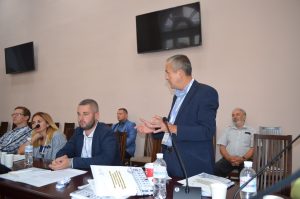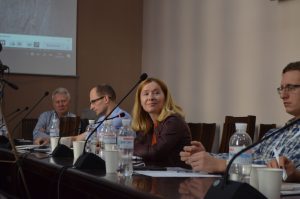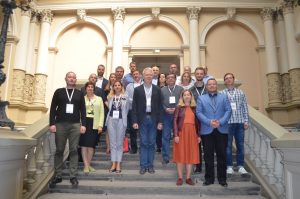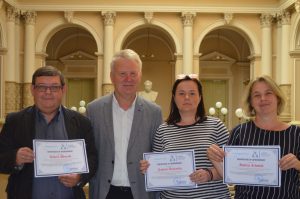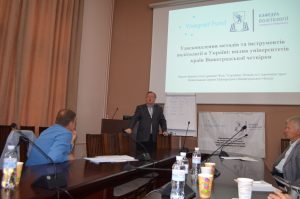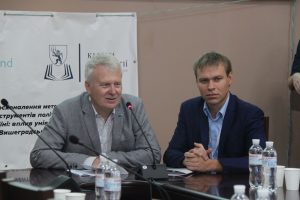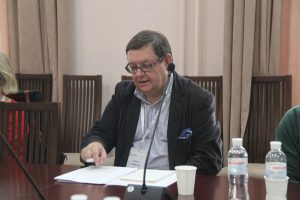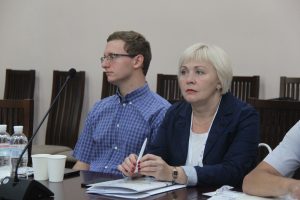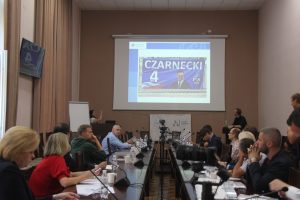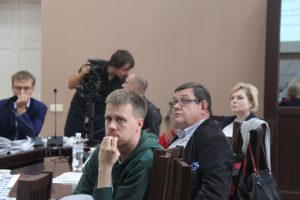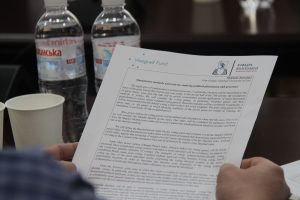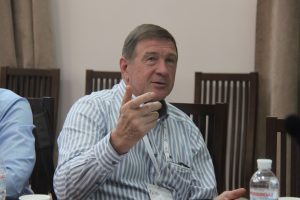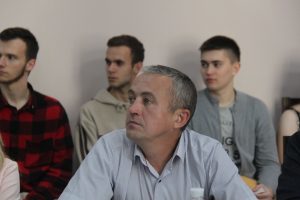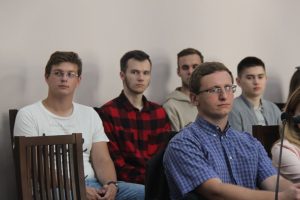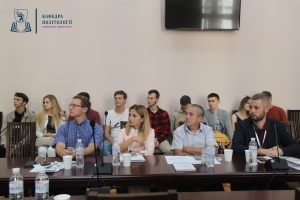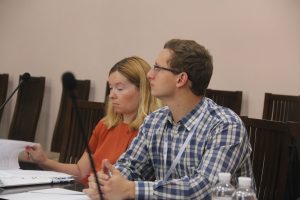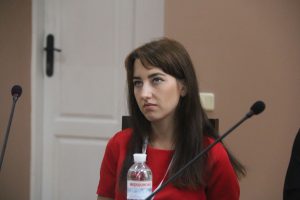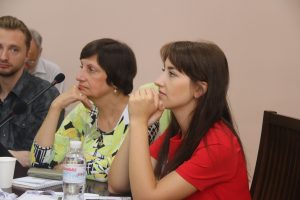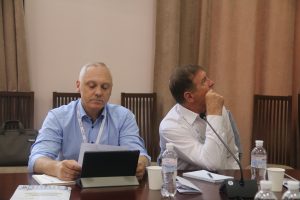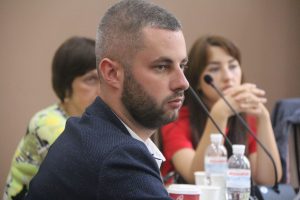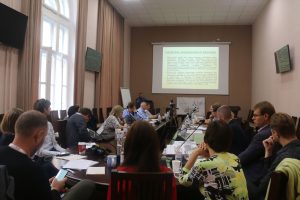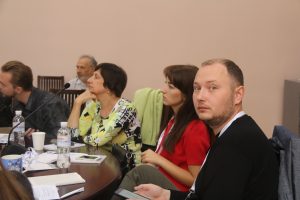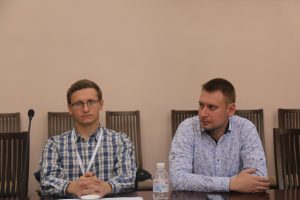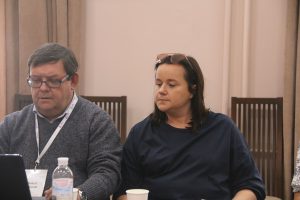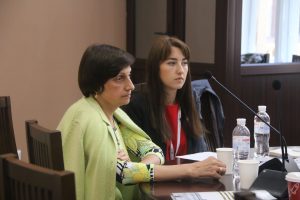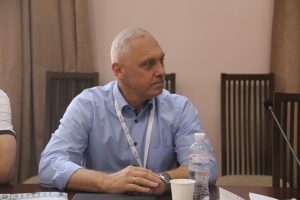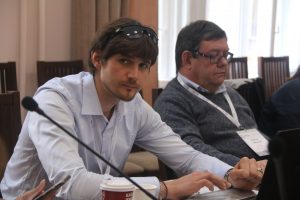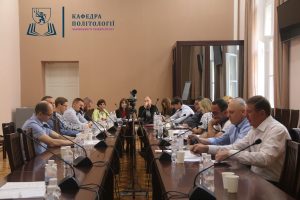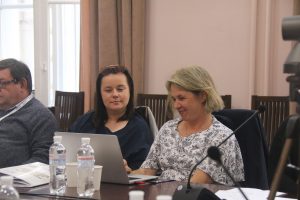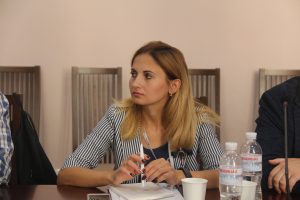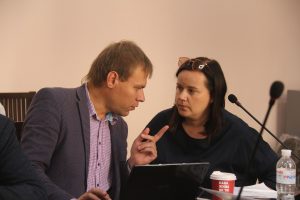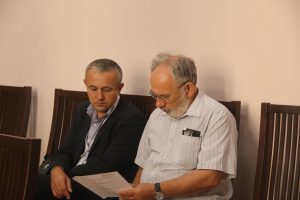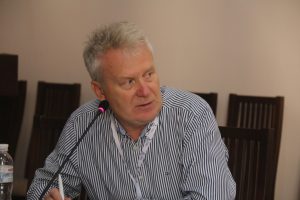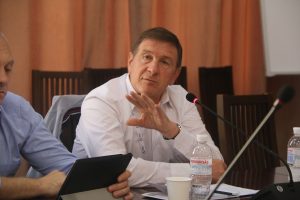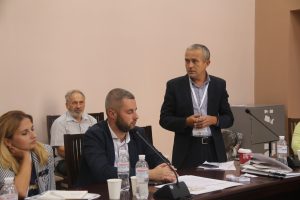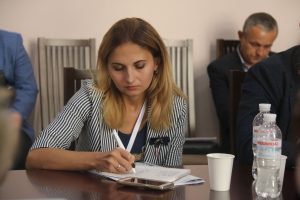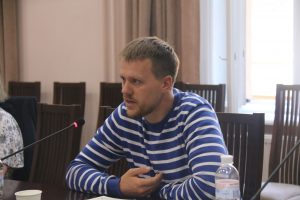On 13-15 of September 2019, was organized a series of theoretical and practical workshops on the problems of methods and tools of Political Science within the framework of the project “Improvement of Methods and Tools of Political Science in Ukraine: Influence of the V4 Universities”
The project and the workshops within it are funded by the International Visegrad Fund. The representatives of the partner institutions from the Visegrad Group countries and Ukraine worked as experts in the workshops. The workshops’ participants were teachers and doctoral staff of the Department of Political Science (the project’s executor) and other departments dealing with Political Science in different cities of Ukraine.
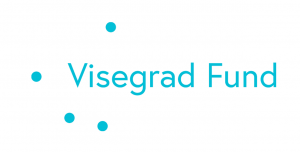
A series of theoretical and practical workshops was opened by the project coordinator Vitaliy Lytvyn (Associate Professor at the department of Political Science, Doctor of Political Science), the Head of the department of Political Science Anatoliy Romanyuk (Full Professor at the department of Political Science, Doctor of Political Science), and the Vice-Rector of Ivan Franko National University of Lviv.
The first expert of the workshops was Robert Alberski, Doctor of Sciences, Habilitated Doctor, Full Professor, Director of the Institute of Political Science at the University of Wroclaw. He gave the presentation entitled “Methodological approaches to the study of political systems. Toolkit for research on political advertising”. The focus of the workshop was mainly on modern tools for analyzing political systems and political advertising. Emphasis was payed to three methodological approaches, namely Actor Network Theory, Corpus Linguistics’ Methodology and Semiometry Methodology. During the workshop the expert: outlined the basic functions of political advertising; considered the measurable benefits of political advertising for political actors; analyzed the role of the Internet and Social Networks in electoral campaigns and political competitions; defined the specifics and directions of professionalization of political advertising; voiced the need for updating the methodological and instrumental apparatus of political advertising research in different political systems.
The second workshops’ expert was Joanna Kozierska, Doctor of Sciences, Assistant Professor of the Institute of Political Science at the University of Wroclaw. She presented a report “Methodological approaches to studying political campaigns. Toolkit for the study of elections and election campaigns”. The purpose of the workshop was to present a modern understanding of the nature of elections and functions they hold, but first to show the electoral campaign as a phenomenon without which modern democracy cannot function. The report focused on such topics as: elections and their functions; ways of determining electoral campaigns; electoral campaigns’ typology; duration of electoral campaigns; tools and threats of modern electoral campaigns (including the example of the Visegrad Group countries and other countries of Central and Eastern Europe). It was stated that a modern and professional electoral campaign cannot function without political marketing tools, which need to be adapted to the scale of an electoral activity.
The third expert of the workshops was Michal Cirner, Doctor of Sciences, Associate Professor of the Institute of Political Science at the University of Prešov. His report was on “Classical and modern approaches to the study of political ideologies and public policy”. The first part of the report focused on classical dichotomies in the study of the place of political ideologies within the framework of implementation of various types of public policy (mainly democratic and undemocratic), including through the prism of Central and Eastern European countries. In particular, the expert traced the influence of different types of political ideologies and public policy on the formulation of the roles of politicians and civil servants. The second part of the report further analyzed the socio-economic factors and risks that determine political ideologies within public policy. At the same time, the emphasis was placed on the risks of corruption within different variants of the combination of political ideologies and public policy. On this basis, an attempt was made to rethink the essence of the state at the current stage of development of political ideologies. It was generally argued that specific political ideologies are not dominant in managerial, organizational, marketing, and other approaches to the research of public policy.
The fourth expert of the workshops was Natalia Maradyk, Doctor of Sciences, Associate Professor of the Institute of Political Science at the University of Prešov. She presented the material on the topic “Toolkit for the study of party systems in V4 countries and other countries of CEE. Global processes and cross-border cooperation: the methods of analysis”. The first part of the report focused on the phenomenon of political pluralism as a main driver of transformation and exploration of party systems in the Visegrad countries, in particular in the framework of their social transformation. At the same time, the expert raised the issues of the main factors that influence the formation of party systems in the countries of the analyzed region (in particular, the logic of the transformation process, the choice of system of government and electoral system, social and political differences). Thus, an attempt was made to create a research model that could analyze the evolution of party structures under transformation. In the second part of the workshop, the emphasis was made on the phenomenon of cross-border cooperation as a promising form of development of international, regional and local relations in the Visegrad countries. In view of this, the expert analyzed the features of the various forms of cross-border cooperation, the parameters of their research and the expected consequences, in particular for the countries of the Visegrad Group and Ukraine.
The fifth workshops’ expert was Andrea Schmidt Gal Zoltanne, Doctor of Sciences, Associate Professor of the Department of Political Science and International Studies at the University of Pécs. The topic of her report was “Tools for studying political transitions. Methodological approaches to the study of finances in Political Science”. The first part of the workshop presented the theoretical background for the study of the given topic, in particular the nature and factors of transformations, including in the countries of Central and Eastern Europe (mainly in Hungary). The second part of the report emphasized the study of political transformations through the prism of social structure and economic development of particular states, in particular as not always linear processes. Finally, in the third part of the workshop, the expert analyzed and informed the participants about the real features of transition in the Visegrad countries, in particular about: the historical legacy of transformations, the socialist economy as a path to transformation, the models and subjects of transformations, the phenomenon of the crisis of redistribution of resources, the peculiarities of the geo-economy of Central and Eastern Europe, the real risks and positives of the integration processes of the countries of the analyzed region into the EU.
The sixth expert of the workshops was Anatoliy Romanyuk, Doctor of Sciences, Habilitated Doctor, Full Professor, the Head of the Department of Political Science at Ivan Franko National University of Lviv. He gave the presentation on the topic “Methodological basis of electoral researches. Theoretical and practical aspects of conducting election campaigns”. It answered the question of what should be classified in the electoral researches and what they are. In particular, the emphasis was placed at: the study of the moods and preferences of citizens with separation by different criteria (region, age, gender, type of settlement, etc.); the analyzes of political parties and political actors; the study of the features and threats determined by the use of particular types of electoral systems. Particular attention was paid to: the importance of sociological researches; the parameters of quantitative characteristics of party systems; the examples of electoral researches in certain international projects. Among them, the expert focused on the projects “The World Values Survey” and “The Comparative Study of Electoral Systems”. Special attention was paid to the field experience of conducting electoral surveys during electoral campaigns.
Finally, the seventh expert was Mykhailo Zarichnyi, Doctor of Sciences, Habilitated Doctor, Full Professor of the Department of Geometry and Topology at Ivan Franko National University of Lviv. He delivered a report entitled “Quantitative methods and tools for studying political phenomena and processes”. The expert initially told about the history of involving mathematical methods in the study of political institutions, phenomena and processes. After that, the professor moved towards the importance of the game theory in modern Political Science, and then focused on the game-theoretical methods of studying real politics. Finally, the expert touched upon the issues of the indices of strength/power and influence of various political actors, in particular at the national and international level. As a result, the mathematical models of research of voting systems, in particular the practice of strategic voting, were considered. Finally, the professor spoke about some of the geometric aspects of voting, including the practice of jerrymandering.
In addition, the workshops presented the information about the project’s goals, the prospects for cooperation with the International Visegrad Fund and partner institutions from the Visegrad Group countries. As a result of the workshops, a collection of materials or a collective monograph will be prepared and distributed in the educational and scientific process. One of the results of the workshops is that its participants not only gained experience from the experts from the countries of the Visegrad Group and Ukraine, but also exchanged with the information and experience, which will be disseminated in educational and research institutions of Ukraine and the countries of the Visegrad Group, and will contribute to the improvement of methods and tools of Political Science in the future.
